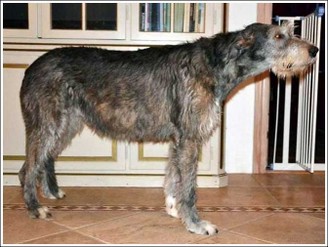
Pneumonia
Pneumonia in Irish Wolfhounds is often misunderstood and misdiagnosed. It is critical that all Wolfhound owners familiarise themselves with the symptoms of pneumonia
and how it presents in Wolfhounds as quick action is critical to the success of treatment.

The typical stance of an Irish Wolfhound
in the early stages of pneumonia.
in the early stages of pneumonia.
A Wolfhound in the typical prone position of pneumonia.
The IWHG have been given kind permission by the Harp and Hound, IWCA to share with you their most recent update to their IW Pneumonia Treatment Protocol (see above). Specific drugs are recommended which may differ by trademark name between countries whilst being the same drug or of the same drug family. There are important similarities between both protocols which should be noted.
SPEED Treatment must be initiated rapidly, in order to do this an owner must be able to quickly recognise the symptoms. Wolfhounds can deteriorate very quickly if left even for a few hours before initiating treatment. Successful outcomes are positively correlated with prompt treatment initiation.
SPECTRUM Treatment should include broad spectrum antibiotics to act against the common bacteria responsible for causing pneumonia. This is usually achieved by combining two antibiotics which collectively fight against gram-negative, gram-positive and anaerobic bacteria. In severe illness a third antibiotic may even be included in the regime.
DURATION Antibiotic treatment should be continued for 4-6 weeks after all symptoms are resolved. Recurrent pneumonia is very common, and more likely to happen where the initial course of antibiotics is not continued for the recommended length of time.
Beware of misdiagnosis Wolfhounds are unique in their presentation of pneumonia. They may have a normal temperature and their lungs may appear clear on x-ray for several days after the dog first shows signs of illness. There have been a number of cases of vets misdiagnosing pneumonia as heart failure. If your wolfhound has clear lungs, does not have a raised temperature, but does have atrial fibrillation, some vets will put the difficulty in breathing down to heart failure, and treat that, not the pneumonia. It is important that you are an advocate for your hound.
Historical observations In the UK, Excenel, a third generation cephalosporin, is recommended by Wolfhound people with experience of pneumonia. However, it is not licensed for dogs; it is licensed for pigs, so it’s very likely that your vet may not stock it and if they do, they may be reluctant to prescribe it in this situation. It is therefore very important to discuss this disease and therapy with your vet before the need arises. You may be asked to sign a waiver in order to obtain it. Anecdotal evidence suggests Excenel is given as a 4.5ml subcutaneous injection every 24 hours – and is often combined with Antirobe. This dosage is based on experience and a history of success using the drug for pneumonia in the Wolfhound. It has been observed that treatment length can vary from five days to six weeks, depending on the severity of the infection.
Note to Veterinary Surgeon Excenel is marketed as Naxcel in the US. Naxcel is licensed for UTIs in dogs, information regarding Naxcel can be found on the Pfizer website.
Recognizing pneumonia
- Sudden onset.
- Difficulties in breathing.
- Head lowered and stretched forward level with the back, neck extended to expand the airway as much as possible.
- Dog reluctant/unable to lie on its side.
- Dog may or may not be coughing.
- Temperature may be very high – but a normal temperature does not necessarily preclude a diagnosis of pneumonia.
- Lungs may appear clear on x-ray.
There have been cases of pneumonia in wolfhounds following a lungworm infection. Lungworm is no longer restricted to the south of England, and is present in most areas).

This is the typical stance of an Irish Wolfhound with pneumonia, with the head and neck stretched forward. The eyes are preoccupied and dull, she is reluctant to lie down and if she does is unable to lie on her side. The photograph was taken as soon as the dog became ill. Her owner, who knew the signs of pneumonia, said "When the photo was taken she had difficulty breathing, couldn't lie down, and had a temperature of 40.2 degrees C".
Remember though that not all pneumonia cases will have a raised temperature and not all will show any lung congestion on X-ray. Immediate treatment is absolutely essential regardless. Please see our Pneumonia Guide for more information.



Treating pneumonia
- URGENTLY If there is any doubt, treat with the antibiotics first, and argue later – do not take a wait and see attitude.
- Most vets will want to administer an antibiotic intravenously, as it is important to hit it hard and fast.
- Fluids intravenously should be considered – but care should be taken if your wolfhound has a heart condition.
- Excenel is the drug recommended by wolfhound people who have had experience of pneumonia in the UK.
- Other antibiotics have been used – Ceporex, Baytril and Antirobe, Cefuroxime, Zithromax, Marbofloxacin and Trimethoprim sulfa, but there is a better chance of preventing a recurrence with Excenel.
- Drug treatment needs to continue for at least four weeks.
- Steam and coupage* can assist in moving the congestion from the lungs.
If your wolfhound has had pneumonia, it is more likely to have it again.
Convincing/alerting vets
BEFORE THIS HAPPENS – Please have a conversation with your veterinary surgeon to ascertain their views on using Excenel should the situation arise. When a dog is already sick, it is not a good time to find out that your veterinary surgeon will not consider alternative treatments from the mainstream.
The IWHG comprises members of each of the breed bodies. None is a qualified veterinarian: any suggestions made are based purely on the personal experience of those wolfhound owners who have had to use the drugs mentioned and are a guide only for you to discuss with your own vet. It is the responsibility of the owner to make a decision on any course of action they take with their hound and we strongly recommend that this is done in conjunction with your vet.
* For those unfamiliar with the technique of coupage ( also known as percussion therapy), we have found this video demonstration that you might find useful.
November 2019
At the IWHG Breed Health Seminar, Dr Angela Bodey gave an update on the progress of then pneumonia survey, which can be downloaded here.
April 2018
Pneumonia survey
In response to our request for cases of hounds that have suffered from pneumonia we have decided to broaden the scope of the study and need details of Wolfhounds who have suffered from pneumonia or any other respiratory disease, including nasal disease and rhinitis. All information will be collated by the IWHG and forwarded to Dr Angela Bodey BSc, BVSc, PhD, MRCVS and Dr Mark Dunning MA, VetMB, PhD, CertSAM, DipECVIM-CA, MRCVS at Nottingham Veterinary School.
You can take part in the study here.
June 2015
Great news. The pneumonia study is moving into the next phase. Mark Dunning of Nottingham University and Angela Bodey, who undertook the first stage of the study for the Health Group, are expanding the survey to include all cases of acute respiratory disease in the Irish Wolfhound. Whether diagnosed as pneumonia or not, all such cases carry an equal risk to the Wolfhound and should be investigated immediately so the right treatment can be prescribed. More details to follow on how you can help with the research so - watch this space!
April 2014
PNEUMONIA SURVEY PROGRESS
As it is almost one year to the day that we started work on this survey I felt you should have some information on our progress so far. Although Angela Bodey is keen to receive details of any hound who develops a recurrence of pneumonia having filled in an initial survey, 31 March was the cut-off date for all new surveys and she is now starting to analyse all the information received.
On 8 May she is seeing Mark Dunning from the School of Veterinary Medicine and Science, Nottingham University to meet the Evidence Based Medicines team to look at software which would be suitable to use with her data and enable her to do robust statistical analyses and create something that will stand up in a scientific arena with the goal of publishing in a peer-review journal, probably the Journal of Small Animal Practice. Following this meeting she will then have a month to further prepare her data and conclusions before she gives the presentation in Finland in June.
Many, many thanks to all who have completed survey forms. Hopefully we are getting closer to being able to produce an evidence-based protocol for the treatment of pneumonia in Irish Wolfhounds which can be given to all vets.
Anne Wilson



